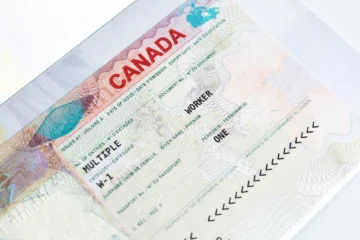In this blog post, we will provide an overview of the process for obtaining a study permit, including the requirements for eligibility, the responsibilities that come with holding a study permit, and the documents that are needed. We will also cover the steps involved in the application process, including the potential for an interview or medical exam, as well as what to do if your application is rejected or if your permit expires. Our lawyers and immigration professionals at Pax Law are here to help guide you through the process of applying for or extending a study permit.
Table of contents
- What is a study permit?
- Who can apply for a study permit?
- What are your responsibilities while studying in Canada?
- What documents do you need?
- What happens after you apply?
- How to extend your study permit?
- What to do if your permit has expired?
- Returning home or travelling outside of Canada while studying?
- Sources
As an international student in Canada, obtaining a study permit is essential in order to legally study at a designated learning institution (DLI). It is important to note that a study permit is a specific designation on a general type of visa called a “temporary resident visa” (“TRV”).
What is a study permit?
A study permit is a document that allows international students to study at designated learning institutions (DLIs) in Canada. A DLI is a school approved by the government to enroll international students. All primary and secondary schools are DLIs. For post-secondary DLIs, please refer to the list on the government of Canada website (https://www.canada.ca/en/immigration-refugees-citizenship/services/study-canada/study-permit/prepare/designated-learning-institutions-list.html).
Most international students require a study permit to study in Canada. You must provide certain documents that will be covered in this article and should apply before travelling to Canada.
Who can apply for a study permit?
To be eligible, you must:
- Be enrolled at a DLI and have a letter of acceptance;
- Show ability to support yourself and family members financially (tuition fees, living expenses, return transportation);
- Have no criminal record (may need a police certificate);
- Be in good health (may need a medical exam); and
- Prove that you will return to your country at the end of your period of stay in Canada.
Note: residents in certain countries can get a study permit faster via the Student Direct Stream. (https://www.canada.ca/en/immigration-refugees-citizenship/services/study-canada/study-permit/student-direct-stream.html)
What are your responsibilities while studying in Canada?
You must:
- Progress in your program;
- Respect your study permit’s conditions;
- Stop studying if you stop meeting the requirements.
Conditions vary per case, and may include:
- If you can work in Canada;
- If you can travel within Canada;
- The date you must exit Canada;
- Where you can study (you can only study at the DLI on your permit);
- If you need a medical exam.
What documents do you need?
- Proof of acceptance
- Proof of identity
- Proof of financial support
You may require other documents (eg, a letter explaining why you want to study in Canada and that you acknowledge your responsibilities as per the study permit).
What happens after you apply?
You can check processing times here: https://www.canada.ca/en/immigration-refugees-citizenship/services/application/check-processing-times.html
- Immigration, Refugee, and Citizenship Canada (“IRCC”) will book a biometric appointment to get your fingerprints and photo taken.
- Your study permit application gets processed.
- Your application is checked to ensure all documents are provided. If incomplete, you may be asked to provide the missing documents or your application may be returned without processing.
- You may also need to interview with a Canadian official in your country or provide more information.
- You may also need a medical exam or police certificate.
If your application is approved, you will get a study permit mailed to you if you are in Canada or at the port of entry when you get to Canada.
If your application is rejected, you will get a letter explaining why. Reasons for rejection include failure to show proof of financial support, to pass the medical exam, and to show that your only goal in Canada is to study and that you will return to your country when your study period ends.
How to extend your study permit?
The expiry date of your study permit is in the top right corner of your permit. It is usually the length of your program plus 90 days. If you want to keep studying in Canada, you need to extend your permit.
It is suggested that you apply for an extension more than 30 days before your permit expires. Our lawyers and immigration professionals at Pax Law can help you with the application process. If your permit has expired, you must apply for a new study permit which is typically done online.
What to do if your permit has expired?
If your permit has expired, you cannot study in Canada until your status as a student is restored. You may lose your student status if your permit expires, if the conditions of your study permit change, such as your DLI, your program, length, or location of study, or if you fail to respect your permit’s conditions.
To restore your student status, you must apply for a new permit and apply to restore your status as a temporary resident in Canada. You can stay in Canada while your application is processed, but there is no guarantee that it will be approved. When applying, you must select to restore your status, explain the reasons why you require to extend your stay, and pay the fees.
Returning home or travelling outside of Canada while studying?
You can return home or travel outside of Canada while studying. Note that your study permit is NOT a travel document. It does not grant you entry to Canada. You may need an Electronic Travel Authorization (eTA) or a visitor visa (temporary resident visa). If IRCC approves your application for a study permit, however, you will be issued a TRV allowing you to enter Canada.
In conclusion, obtaining a study permit is a crucial step for international students who wish to study in Canada. It is important to make sure that you are eligible for a study permit and to gather all the necessary documents before beginning the application process. It is also essential to understand the responsibilities that come with holding a study permit and to make sure that your permit remains valid throughout your studies.
If you need help with the process of applying for or extending a study permit, our lawyers and immigration professionals at Pax Law are here to assist you. We are committed to helping you navigate the complex process of studying in Canada and to ensure that you are able to focus on your studies without worrying about your legal status.
The information on this page should not be construed as legal advice. Please consult a professional for advice if you have questions about your specific case or application.



0 Comments